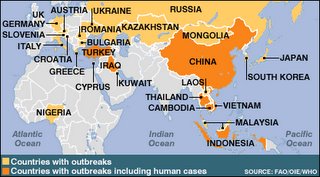Bird Flu --Deadly Pandemic

Is Asia ready for bird flu?
http://news.bbc.co.uk/2/hi/health/4360334.stm
By Chris Hogg, BBC Hong Kong correspondent
In one market near where I live in Hong Kong there's a vision of the future.
It's a stall that sells the chickens the Hong Kong housewives like to buy still alive to ensure their freshness. But the stall-holder and her birds are behind a pane of glass that stretches from floor to ceiling. She is in effect encased in a large box. She's almost completely separated from her customers. When they buy a chicken she kills it, plucks it and wraps it up before passing it through a small gap in the wall. The customer's contact with her or her birds is reduced to a minimum.
These are the kind of measures the scientists say are needed throughout Asia if we're to have any realistic chance of protecting ourselves from bird flu - in addition to the stockpiles of anti-viral drugs like Tamiflu or the yet to be produced anti-bird-flu vaccine. But in reality we're not going to see measures like that across Asia.
'A plane ride away'
While Hong Kong might be what the World Health Organization (WHO) describes as the 'gold standard in terms of surveillance and measures designed to prevent the emergence of bird flu', poorer nations in South East Asia just don't have the same kind of resources to throw at the problem.
That is the biggest issue facing Asian governments. The bird-flu virus H5N1 has been circulating in this region for at least two years.
Not ready
Compare that with the situation in Vietnam today.
The New York Times reported recently that while two years ago when a case of bird flu was discovered every chicken within a radius of about 5km of the infected fowl would be slaughtered, today officials kill only those birds in an infected flock that do not die from the disease itself.
The reason, the newspaper says, is a lack of money to compensate the farmers. And then there are the allegations of corruption in Indonesia which mean the country has to test its entire stock of bird flu vaccine because government auditors suspect companies have produced doses of inferior quality to inflate profits.
Or fears raised by opposition politicians in South Korea that the government doesn't have enough intensive care facilities to treat a mass outbreak of any kind of communicable disease.
So yes, Asia has woken up to the threat posed by this disease.
But is it ready? No, there's a lot to do.
Although in some places they're doing their utmost to take adequate precautions, this region is nowhere near a position to fight an outbreak in anywhere but the most developed or affluent areas.
"We are hoping the resources now being discussed in the West will now make it possible to protect the populations of the poorest countries," says the WHO's Peter Cordingley, but he warns "It's a slow business, and how long do we have?"
For more information on 'How bird flu has spread', see http://news.bbc.co.uk/2/hi/in_depth/world/2005/bird_flu/default.stm
For bird flu's impact on the globe, please refer to

0 Comments:
Post a Comment
<< Home